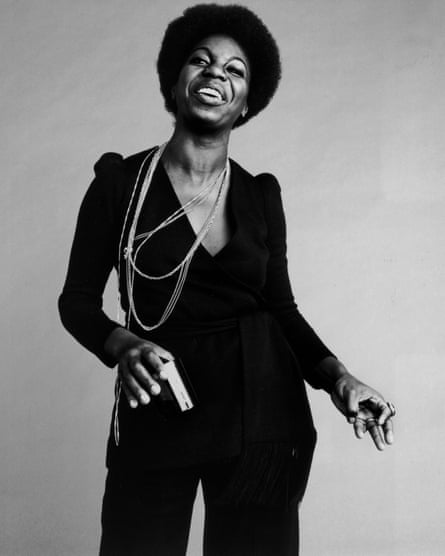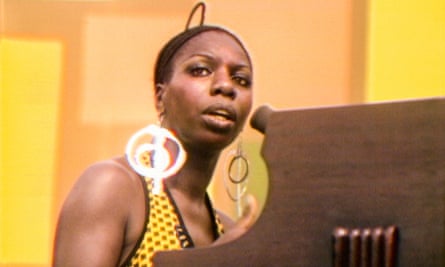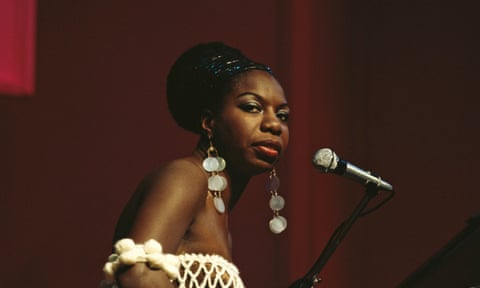20. Pirate Jenny (1964)
One thing Nina Simone had in abundance was attitude, which can be heard in her frankly astonishing version of Brecht and Weill’s Pirate Jenny. It is a theatrical piece that she sings as if she means every word, her vocal dripping with venomous relish as it delivers its saga of murderous revenge: listening to it feels like being pinned to a wall.
19. My Baby Just Cares for Me (1958)
You can see why Simone tired of the song that remained most closely associated with her: its breezy ease is the antithesis of her weightier, more political material. But listen to that piano solo: classical leanings and a feel for swing distilled into something that is entirely her own and incredibly stylish.
18. The Desperate Ones (1969)
The self-explanatory title Nina Simone and Piano! was apparently Simone’s favourite of her own albums. Certainly, its closing version of Jacques Brel’s Les Désespérés is incredibly powerful: her raw, whispery vocal is close-mic’d and intimate, turning a song about the death of youthful idealism into an eerie eulogy for the revolutionary zeal of the late 60s .
17. Fodder on Her Wings (1987)
An impossibly moving cry of despair from Simone’s exile in France, clearly rooted in personal experience, Fodder in Her Wings first turned up on a largely ignored 1982 album, but the killer version (with a tweaked name) – taut, wrenching and accompanied by piano rather than tinny synth – is on 1987’s live Let It Be Me.
16. Mr Bojangles (1971)
You could pick any cover from 1971’s Here Comes the Sun for this list – the Five Stairsteps’ O-o-h Child and Bob Dylan’s Just Like a Woman among them – but the sweet sadness of Simone’s take on country singer Jerry Jeff Walker’s Mr Bojangles is particularly sublime: Sammy Davis Jr modelled his signature version on hers.
15. Funkier Than a Mosquito’s Tweeter (1974)
The breakbeat-hunting cratedigger’s favourite Simone track, but there is far more to it than its writhingly danceable rhythm: Ike and Tina Turner’s original was a dismissal of an old lech, but Simone turns it into a dismissal of the US itself, a country she had already departed by the time of the song’s release.

14. Ain’t Got No/I Got Life (1968)
Of all Simone’s musical reinventions, there is something particularly pleasing about Ain’t Got No/I Got Life: two songs from Hair, a cash-in musical that served up the late-60s counterculture as supposedly edgy entertainment for Broadway and West End theatregoers, that were recast as a racial protest song: concise, punchy and defiant.
13. Don’t Let Me Be Misunderstood (1964)
Sometimes, Simone’s interpretations transformed songs. Sometimes, they amplified them. Her terrifying cover of Strange Fruit is a case in point and so is Don’t Let Me Be Misunderstood. No other version digs so deep into its themes of anger and regret, or sounds so racked with guilt: she audibly knew of what she spoke.
12. My Sweet Lord/Today Is a Killer (1972)
Simone’s live version of George Harrison’s solo hit starts out straightforward enough, amping the song into joyous gospel, before turning it on its head, interpolating a poem by the Last Poets’ David Nelson about feeling abandoned by God. Harrison’s gently beseeching tone is transformed into a terrified howl into the void.
11. Backlash Blues (1967)
By the time Langston Hughes presented Simone with the lyrics to Backlash Blues, the anger she had expressed in Mississippi Goddam was erupting across the US. There is a hint of I-told-you-so about her delivery, a confidence that offsets its ache – “You’re the one who’ll have the blues, not me” – and only adds to its power.
10. Stars/Feelings (1976)
The crushing centrepiece of the psychological white-knuckle ride that was Simone’s 1976 performance at the Montreux jazz festival. She genuinely appears to be on the brink of a breakdown, investing both songs in the 17-minute medley with a fragile intensity so potent it’s almost unbearable: disturbing, haunting, unforgettable listening.
9. Why? (The King of Love Is Dead) (1968)
Recorded on stage three days after Martin Luther King’s murder, performances come no more charged and raw than this. It slips between mourning, despair and militant rage, particularly in its 13-minute, unedited form, punctuated by Simone’s lengthy, emotional, extemporised monologue: “We can’t afford any more losses, they’re shooting us down.”
8. I Loves You, Porgy (1959)
Simone was 25 when she released her debut album: what is startling is how assured she already sounded. Assured enough not just to take on I Loves You, Porgy – already, and seemingly definitively, recorded by Billie Holliday – but to stamp her own identity on the song, balancing tenderness, desperation and uncertainty.
7. Sinnerman (1965)
Oft-sampled, but never improved upon, the adjective that best fits Sinnerman is fierce: the hellfire-and-brimstone take on religion, involving a God who tells her to get stuffed; the lyrics with its bleeding rivers and boiling seas; the focused insistence of Simone and her band’s performance over the course of its 10 minutes.
6. Four Women (1966)
A controversial assault on racial stereotypes and the imposition of white beauty standards, Four Women is a masterpiece of slow-burning rage, gradually amping up its intensity over a simple, repetitious piano figure: the moment when Simone’s voice finally cracks into guttural fury as she hits the song’s closing line is shattering.
5. I Wish I Knew How It Would Feel to Be Free (1967)
Told to tone down the politicking by her label, Simone obliged with 1967’s love song-heavy album Silk and Soul. Or rather, she almost obliged, slipping in something that starts out gentle and ends up incredibly funky, which you could just about mistake for a love song but clearly wasn’t: a civil rights anthem was born.
4. Feeling Good (1965)
Feeling Good became a TV talent show staple in the 00s, stripping it of its distinct civil rights undercurrent – a miserable fate for such a fantastic song – but umpteen lousy covers can’t dim the ferocious impact of Simone’s definitive reading: its slow build from a cappella to show-stopping finale is unforgettable.

3. To Be Young, Gifted and Black (1970)
The documentary Summer of Soul shows Simone performing the incendiary Are You Ready? at the Harlem cultural festival. Debuted the same day, To Be Young, Gifted and Black was at the opposite end of the protest spectrum, an irresistible tough-but-optimistic expression of pride, subsequently turned into reggae gold by Bob and Marcia.
2. I Put a Spell on You (1965)
Screamin’ Jay Hawkins’ original is fantastic, but wilfully OTT, befitting his shock-horror image. Simone’s version – lushly orchestrated, with a sax solo that points up its bluesy origins – is anything but: she removes the cartoonish excesses, revealing a smouldering song about lust that is simultaneously sexy and slightly disconcerting in its forcefulness.
1. Mississippi Goddam (1964)
Simone claimed she wrote Mississippi Goddam as an alternative to murdering someone in retaliation for the racist bombing of an Alabama church that killed four children. She wasn’t joking: she started writing after failing to avail herself of a gun, the song “erupting … faster than I could write [it] down”. It erupted again the first time the world heard it, at Carnegie Hall: the recording is electric, the song churning urgently on, a flash of anger still blinding nearly 60 years on. Almost everything in this chart has a claim to be Simone’s greatest song – she was that good – but Mississippi Goddam remains her most vital.
